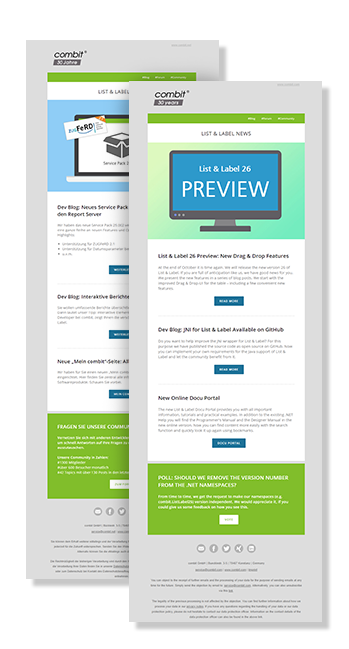The latest service pack 30.001 for List & Label brings support for Windows Server 2025 and expands our .NET 6 and .NET 8 assemblies with support for DesignerControl.
Customer satisfaction is a crucial factor in List & Label’s success. That’s why we invited you back in January to participate in our List & Label survey. We value your feedback on both the product itself and our services. And, of course, we were anxious to receive your input regarding improvements and what you would like to see in the future.
Faster reports, more flexible export, and the option to upload to secured FTP servers: The new Report Server 28 offers many new functions for its users. Some are customers’ wishes, like using project includes and subreports. This way, recurring elements such as letterheads, tables or charts can easily be reused in new report templates.
This is a summary of the major new features and improvements in Service Pack 28.001, including new export features and bar charts for the Web Report Designer. For a detailed list of all changes, see the ServicePack.pdf in your installation or in the Service Pack download section.
The Web Report Designer is a central element if you’re using List & Label in web applications. We’re constantly improving and adding to it, and with the release of version 28, we’ve added many new objects and functions again. Here’s a quick overview of the new features.
In this summary you will find the most important new features and improvements in Service Pack 26.009. A detailed list of all changes can be found in the ServicePack.pdf in your installation as well as in the Service Pack download section.
List & Label 28 provides some new features and improvements for .NET developers. Most important, we’re now supporting the just released .NET 7. Performancewise, the optimized use of byte arrays for images makes a noticeable difference. And there’s also news regarding the support of new data sources. Here’s a list of the new features.
This blog post was prompted by a discussion in our forum. One of our customers, who’s been using List & Label since 1995 (which actually goes back longer than my own experience!) sent us a message, telling us that due to fear of errors, he usually waits for up to a year after the release, before finally implementing a new version. Right here, I’d like to explain why I don’t think that’s a good idea, and give you a bit of an insight into our quality assurance. We want you to feel good about using List & Label in your applications on a daily basis.
Up until version 27, you were able to use the HTML5 Viewer in your own .NET web applications in order to display a report preview directly in the browser. Interactive user actions such as drill down, filtering data using report parameters and much more were already possible. But the technology that was utilized for this is getting older now, as for example the jQuery framework. With the new Web Report Viewer, we have created a modern, highly compatible replacement, which has been available since version 27 (year 2021).
To further improve our export formats, was one of the main areas we focused on with List & Label 28. Specifically, we added a number of powerful new features to the Excel export. Without any further ado, here’s what’s new.
In this summary you will find the most important new features and improvements in Service Pack 27.004. A detailed list of all changes can be found in the ServicePack.pdf in your installation as well as in the Service Pack download section.











